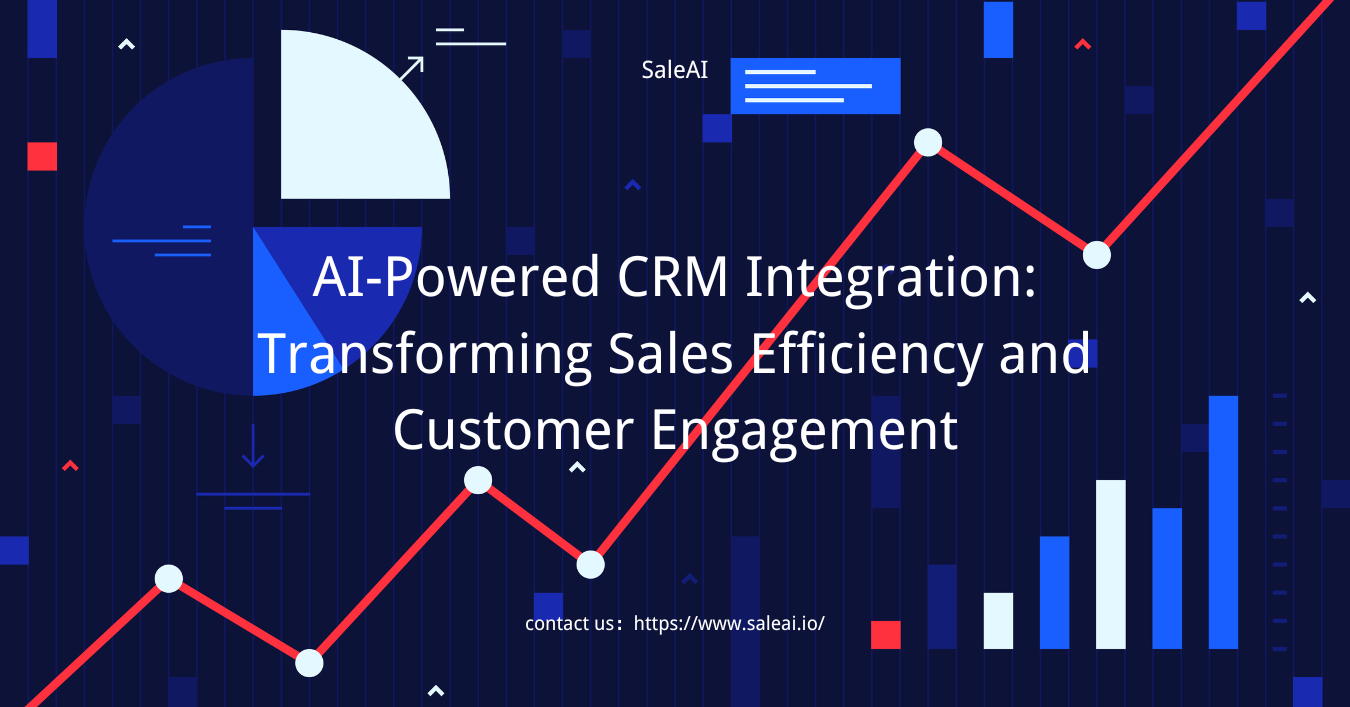Introduction:
In today’s fast-paced business environment, Customer Relationship Management (CRM) systems are the backbone of most sales and customer engagement strategies. However, the potential of these systems often goes untapped when they rely solely on manual data entry and static processes.
Enter AI-powered CRM integration: a game-changing solution that transforms traditional CRM systems into intelligent, dynamic tools for driving sales efficiency and personalized customer interactions. By incorporating artificial intelligence, businesses can automate processes, extract actionable insights, and enhance decision-making in real-time.
In this article, we explore the benefits, features, and real-world applications of AI-powered CRM integration, with a focus on how SaleAI leads the way in revolutionizing CRM strategies for businesses worldwide.
What is AI-Powered CRM Integration?
AI-powered CRM integration involves embedding artificial intelligence capabilities into existing CRM platforms to enhance their functionality. This integration allows CRMs to:
- Automate repetitive tasks like data entry, lead scoring, and follow-ups.
- Analyze large datasets to uncover trends, patterns, and actionable insights.
- Personalize customer interactions through predictive analytics and real-time recommendations.
- Provide sales and marketing teams with tools to make smarter decisions faster.
Unlike traditional CRMs, which merely store and organize data, AI-powered systems actively work to optimize workflows, predict outcomes, and improve customer engagement.
Key Features of AI-Powered CRM Integration
a. Automated Data Entry and Management
Data entry is one of the most tedious and error-prone tasks for sales teams. AI integration eliminates this problem by:
- Automatically capturing and updating contact details, engagement history, and lead activity.
- Syncing data from multiple sources, such as email, LinkedIn, and customer websites, into the CRM.
- Reducing human error and ensuring data accuracy across platforms.
b. Predictive Lead Scoring
AI algorithms analyze historical data and current lead behavior to assign scores based on conversion likelihood. This ensures that sales teams:
- Focus on high-priority leads.
- Allocate resources effectively.
- Improve overall pipeline efficiency.
c. Personalized Customer Interactions
AI-powered CRMs use machine learning to analyze customer data and create tailored experiences. Features include:
- Dynamic content recommendations based on past purchases or interactions.
- Timing optimization for outreach, ensuring messages are sent when customers are most likely to engage.
- Predictive insights into customer needs, enabling proactive support and upselling.
d. Workflow Automation
AI streamlines and automates repetitive processes, such as:
- Scheduling follow-up emails and calls.
- Sending reminders for contract renewals or subscription upgrades.
- Generating reports and analytics dashboards automatically.
e. Real-Time Sales Insights
AI-powered CRMs provide actionable insights by:
- Monitoring sales trends and team performance in real-time.
- Identifying bottlenecks in the sales pipeline.
- Providing recommendations for optimizing strategies based on historical and current data.
Benefits of AI-Powered CRM Integration
a. Increased Sales Efficiency
By automating time-consuming tasks, sales teams can focus on building relationships and closing deals. AI reduces the burden of manual processes, freeing up valuable time for high-impact activities.
b. Enhanced Data Accuracy
AI ensures that CRM data is always up-to-date and free from errors. This leads to better decision-making and more effective sales strategies.
c. Personalized Customer Engagement
With AI-driven insights, businesses can deliver highly personalized experiences that resonate with customers, leading to improved satisfaction and loyalty.
d. Improved Forecasting
Predictive analytics provides businesses with accurate sales forecasts, enabling them to plan resources and budgets more effectively.
e. Competitive Advantage
Businesses that adopt AI-powered CRMs gain a significant advantage over competitors still relying on traditional systems. Real-time insights, automation, and personalization drive better results and faster growth.
How SaleAI Revolutionizes CRM Integration
SaleAI’s AI-powered CRM integration is designed to address the most pressing challenges faced by modern businesses. Here’s how SaleAI stands out:
a. Seamless Integration with Leading CRMs
SaleAI integrates effortlessly with popular CRM platforms like Salesforce, HubSpot, Zoho, and Microsoft Dynamics, enabling businesses to enhance their existing workflows without disruption.
b. Multi-Source Data Sync
SaleAI pulls data from multiple sources, including LinkedIn, company websites, and trade directories, to enrich CRM records with:
- Updated contact details.
- Real-time activity tracking.
- Behavioral and intent data.
c. AI-Driven Recommendations
SaleAI’s platform provides actionable recommendations for:
- Optimizing outreach strategies.
- Prioritizing leads and accounts.
- Identifying upselling and cross-selling opportunities.
d. Advanced Analytics Dashboards
SaleAI’s intuitive dashboards provide a comprehensive overview of:
- Team performance metrics.
- Sales pipeline progress.
- Real-time forecasting and trend analysis.
e. Scalability and Customization
Whether you’re a startup or an enterprise, SaleAI’s CRM integration adapts to your needs, offering customizable features that scale as your business grows.
Real-World Applications of AI-Powered CRM Integration
a. Streamlining Lead Management
A tech company struggling with a disorganized lead database used SaleAI’s CRM integration to:
- Enrich lead profiles with missing information.
- Automate lead scoring to prioritize high-value prospects.
- Reduce lead response times by 30%, resulting in more closed deals.
b. Optimizing Sales Outreach
A B2B SaaS provider integrated SaleAI with their CRM to:
- Automate follow-ups and reminders, reducing manual workload.
- Analyze customer engagement patterns to schedule outreach at optimal times.
- Achieve a 25% increase in email response rates.
c. Enhancing Customer Retention
A global logistics firm leveraged SaleAI’s AI insights to:
- Identify at-risk accounts based on declining engagement.
- Send personalized offers and proactive support to retain customers.
- Reduce churn by 15% in one quarter.
Implementation Best Practices for AI-Powered CRM Integration
- Evaluate Your Current CRM: Assess your CRM’s capabilities and identify gaps that AI can address.
- Choose the Right AI Partner: Select a provider like SaleAI that offers seamless integration and robust AI features.
- Train Your Team: Ensure your sales and marketing teams understand how to leverage AI-powered tools effectively.
- Monitor Performance: Use analytics dashboards to track the impact of AI on your CRM and optimize strategies accordingly.
- Scale Gradually: Start with core features and expand AI capabilities as your team becomes more comfortable with the technology.





